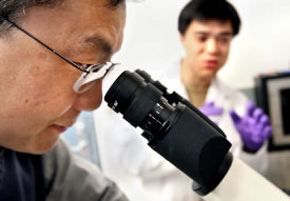Associate's Degree in Chemistry
An associate's degree in chemistry can open the door to several entry level positions for graduating students. With a two-year associates degree in chemistry, graduates can find employment working in a lab as a research assistant or aid. Students who obtain their two-year associates degree will also have the option of going on to obtain a bachelor's degree in chemistry if they so choose. Students seeking to enter an associate's degree in chemistry program should possess a basic understand of high school algebra, as the study of chemistry requires student to learn how to balance chemical equations.
Associate’s Degree in Chemistry Program Coursework
- General chemistry
- Organic chemistry lab
- General physics with a lab
- Algebra
- Trigonometry
- Calculus
General Chemistry Classes for an Associate’s Degree in Chemistry
General chemistry covers the topics of molecular structure, bonding, chemical reactions, periodic trends, acids and bases, and all other basic theories need understand the field. General chemistry courses will provide you with the foundation necessary to understand more advanced chemistry subjects you will study later on during your education.
Organic Chemistry Classes for an Associate’s Degree in Chemistry
Organic chemistry involves organic compounds, mechanisms, syntheses and spectroscopy. Organic chemistry studies the structure, properties, composition and reactions of carbon-based compounds and hydrocarbons. These compounds may contain such elements as hydrogen, nitrogen, oxygen, phosphorus and silicon. Organic compounds form the basis of many products, which include plastics, drugs, food and paints.
General Physics Classes for an Associate’s Degree in Chemistry
Physics courses explore the nature of the physical environment, and explain the how the fundamental forces of nature work through mathematics. Students will learn the process for collecting data, how to organize empirical data into a concise format, while being able to report on the observed data.
Community College Options for Obtaining an Associate’s Degree in Chemistry
While students cannot get a bachelor’s degree in chemistry from a community college, students can complete most of their prerequisites required to obtain their associates degree at one. Community colleges also offer tuition rates much lower than those of most four-year colleges, and can be a great way to save money while in school. Community colleges also cater to many non-traditional students, and tend to have more night and weekend classes.
Greater Earning Potential for Individuals with a Degree in Chemistry
In a research studied conducted by PricewaterhouseCoopers concluded that physical science graduates leave school equipped with the skills needed to find employment in a wide variety of high paying jobs. Studies show that an individual with a degree in chemistry or physics will earn an average of 30 percent more in their lifetime than someone without a degree, and at least 12 percent more than graduates in such liberal arts fields as psychology, English and history. Students who graduate with an associates degree in chemistry have the opportunity to acquire a job as a chemical technician, a position whose median annual salary in 2008 was over $42,000 a year.

